Features
Merchants Of Light
Big Big Train Albums Ranked
by Jason Warburg
“Big Big Train is the antithesis of an overnight success story.”
– BBT Manager Nick Shilton, January 2020
Being a music writer of a certain age means having an established set of tastes and expectations and artists whose work pushes one’s buttons. That history and context makes it that much tougher for anyone to storm the gates of the high-walled keep known as “My Favorite Artists.”
Progressive rock collective Big Big Train made it inside those walls in 2009 after first coming to my attention in 2007, a decade and a half into the band’s existence, at a time when I’d more or less given up on the genre their music is most associated with. Despite being a longtime devotee of the band Yes, one of prog’s foundational artists, I’ve actually never been a big fan of the genre as such. For decades after I first encountered them, ’70s Yes was the only group on the entire prog scene that really hit the mark for me in terms of combining instrumental virtuosity and complexity with strong vocal presence and warm, emotionally engaging songs.
My expectations were thus modest when Big Big Train’s album The Difference Machine arrived unbidden in my mailbox in the dog days of summer 2007, a blind submission from an English prog band I’d never heard of. I admired the artwork, scanned the one-sheet, shrugged, and decided to try it out for a couple of minutes before moving on. An hour later I was still glued to my chair.
While the melancholy tone of its lyrics owes more to Dark Side Of The Moon than Fragile, The Difference Machine captured the band’s intensity and musical charisma very well at a critical juncture. Over the course of the band’s tumultuous early period, BBT co-founders Greg Spawton (guitars, keyboards, songwriting) and Andy Poole (bass, production) emerged as the only stable elements in a steadily shifting lineup that had previously issued four albums. By 2007 the lineup also featured Sean Filkins on vocals and Steve Hughes on drums, but change was in the air again, as the band’s growing profile within the prog community led to TDM featuring guest appearances from, among others, Spock’s Beard drummer/vocalist Nick D’Virgilio.
Soon afterward, Filkins and Hughes departed, leaving Spawton and Poole to rebuild the group’s lineup once more. First in was new lead vocalist David Longdon, a fellow Genesis enthusiast who had been one of two finalists to become that group’s frontman after Phil Collins’ 1996 departure (a role which went to Ray Wilson). Around the same time, D'Virgilio—separated from the rest of the group by an ocean and half a dozen time zones—agreed to become a “permanent guest” on drums and harmony vocals. Next, Longdon helped to recruit former XTC guitarist Dave Gregory into the fold. With Longdon, Spawton and Poole as the core and D’Virgilio and Gregory in constant supporting roles, the band set about recording a new album.
Two thousand and nine’s The Underfall Yard—featuring the above quintet plus the first appearance of the Big Big Train Brass Band, a five-man horn section led by Dave Desmond—proved to be the band’s breakthrough, winning wide acclaim in prog circles. The album’s conceptual frame—songs inspired by history and celebrating the people whose imaginations and toil created modern England—became the foundation for the band’s songwriting going forward. With D’Virgilio and Gregory subsequently signing on as full band members, the group embarked on a growth spurt that saw them deliver a pair of widely praised new albums in English Electric I (2012) and II (2013), which also introduced new member Danny Manners on keys and serial guest Rachel Hall on violin and harmony vocals.
As the band began work on its next studio album and looked ahead to the prospect of playing its complex arrangements live for the first time in nearly two decades, Hall was added as a full band member along with Rikard Sjöblom of Beardfish on guitars, keyboards, and vocals. Both quickly became essential elements of the band’s overall sound, adding fresh depth and texture both instrumentally and vocally, even as band co-founders Spawton and Poole switched over to playing bass and keyboards/guitar, respectively.
The group’s newly expanded lineup then proceeded to go on a creative tear, delving deeper into the historical themes of Underfall and Electric. First came 2016’s Folklore; then a planned supplemental EP blossomed into 2017’s full-length Grimspound. Finally, the unused bits from these two albums’ sessions were collected into “companion album” The Second Brightest Star. Soon after, Poole departed, leaving co-founder Spawton and the remaining six to forge ahead with the yet more expansive vision of Grand Tour, winner of the 2019 Progressive Music Awards Album of the Year. After 29 years in existence, BBT was preparing for its first live dates ever in North America to happen this month, an event now postponed indefinitely by the coronavirus.
Over the past decade the band has conscientiously cultivated a fan base that is both remarkably loyal and quite unique. “Passengers,” as they’re known, gather on the BBT Facebook group to form a mutually supportive and good-natured community that is rare among fans of any sort, but particularly in the often-fractious realm of prog. The sense of fellowship among the group’s followers feels like a direct reflection of the ethos of its songs, which often celebrate Enlightenment values of history, science, art, and community. The band’s ability to translate such cerebral source material into captivating, deeply emotional songs is extraordinary.
At this point, the Big Big Train catalogue spans three decades and roughly a dozen lineups. In the end, though, it all comes down to the music. And the music BBT has made since The Difference Machine is simply magnificent—complex yet accessible, historical yet modern, traditional yet innovative, and consistently full of heart and passion. Much like Yes at its creative peak, playing in the band seems to have brought out the very best in every member of the current lineup—which, considering their musical pedigrees, is saying something indeed.
Enough preface, though. Your coach awaits. Climb on board and let’s begin the journey.
[Note: The list below was updated in March 2024 to reflect the four albums released since it was first published in April 2020. The intro above has not been updated, but if you're interested in a further history of the band, interwoven with personal observations of their first U.S. tour, try this.]
16. Bard (2002)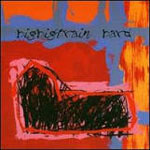
Big Big Train’s third studio album is the only entry in its early catalogue that the band has thus far resisted revisiting, an indication of its principal composer Spawton’s mixed feelings about it. The band’s first excursion into English history and legend is quite proggy in structure and approach, with a pair of 14-minute-plus epics. But the songwriting and arrangements are admittedly patchy at times, with featured songs like “The Last English King” feeling significantly stronger both musically and lyrically than deeper tracks like “For Winter.” Still, to my ear the main issue is Martin Read’s vocals, which just don’t feel suited to the innate drama and grandeur of this style of music.
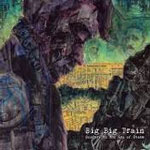 15. Goodbye To The Age Of Steam (1994)
15. Goodbye To The Age Of Steam (1994)
Big Big Train’s 1994 debut showcases the raw elements that would eventually evolve into the band as we know it today—bright melodies, shifting themes and time signatures, references to history and philosophy mixed with more personal themes. That said, in the context of today it mainly serves as a milepost demonstrating how far the band has come from early days. Highlights include the powerful opening to “Wind Distorted Pioneers” and the gentle elegance of instrumental “Dragon Bone Hill,” while “Edge Of The Known World” foreshadows Grimspound’s “Experimental Gentlemen” two decades later. (Note: This ranking is based on the album’s 2011 remixed reissue, featuring three bonus tracks.)
14. English Boy Wonders (1997)
It seems that, just as every writer is compelled to write a coming-of-age story, every songwriter must write a breakup album. Big Big Train’s second album English Boy Wonders is Greg Spawton’s. The Genesis/Yes feel and punchy guitar-keyboard interplay shines on sharp jams like those found in “Big Empty Skies,” “Albion Perfide” and “Reaching For John Dowland,” but Read’s vocals again feel mismatched whenever the proceedings turn heavier. There’s also the matter of length—at 14 tracks and 78 minutes, EBW offers some wonderful bits, but its sheer size dilutes their impact. (Note: This ranking is based on the album’s 2008 remixed reissue, for which Spawton also re-recorded his guitar and keyboard parts.)
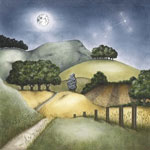 13. The Second Brightest Star (2017)
13. The Second Brightest Star (2017)
This “companion album” to Folklore and Grimspound consists of odds and ends and discarded threads remaining from their sessions. As such, it’s inevitably a bit of a hodgepodge, with four instrumentals among its eight core tracks, plus extended versions of a couple of previously released suites. Highlights include the title track—a melancholy midnight rumination—and the evocative tunes “Skylon” and “The Leaden Stour.” In general, The Second Brightest Star tends to emphasize the more mellow, pastoral side of Big Big Train, while also suggesting that the band knows what it’s doing when editing down to the strongest versions of both its songs and the albums they end up on.
12. Gathering Speed (2004)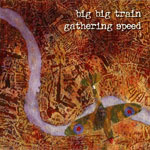
Another critical stepping-stone in BBT’s evolution, and the first of two middle-period releases featuring Sean Filkins on lead vocals, Gathering Speed is a concept album built around the story of a World War II fighter pilot. The band’s musical game has been raised in every respect, with Spawton delivering some of his strongest guitar work on numbers like “High Tide, Last Stand” and “Fighter Command.” GS also delivers more pastoral/symphonic moments (“The Road Much Further On” and the opening of “Sky Flying On Fire”), as well as the very strong title track, a mini-suite full of engaging passages. While the product of a band still in transition, Gathering Speed gave BBT solid momentum leading into The Difference Machine.
 11. Welcome To The Planet (2022)
11. Welcome To The Planet (2022)
The ever-prolific Big Big Train’s albums have often come in twos; like several times before, the group’s 2021 outing Common Ground left a number of strong pieces by the wayside on the path to its final track list. Welcome to the Planet collects those holdovers and builds them into an album that can feel rather disjointed at times, but nonetheless hits on familiar themes and strengths: warmth (“Made From Sunshine”), sweetness (“Capitoline Venus”), adventure (“Lanterna”), memory (“Proper Jack Froster”), and history (“Oak And Stone”). Ultimately, it’s an album where, for once, the individual tracks may be greater than the sum of its parts.
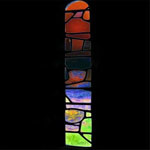 10. The Difference Machine (2007)
10. The Difference Machine (2007)
We’ve already addressed above the entrancing qualities of TDM and critical role it would play in the band’s evolution. The album’s first six tracks alternate between brief, atmospheric instrumental bits and 12-to-14-minute epics, with seven-minute closer “Summer’s Lease” serving as a summation/epilogue. “Perfect Cosmic Storm” features Filkins and the guesting D’Virgilio on chorused lead vocals, riding exactly the sort of shifting, accelerating rhythms its title implies. The other two epics (“Pick Up If You’re There” and “Saltwater Falling On Uneven Ground”) and “Summer’s Lease” are equally absorbing, with sax and viola further expanding the band’s sonic palette, and pointing the way to Hall and the Brass Band.
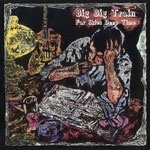 (9.5). Far Skies Deep Time (EP) (2010)
(9.5). Far Skies Deep Time (EP) (2010)
It’s technically not an album, but a 50-minute EP featuring some of the latter-day lineup’s strongest early work simply demands to be included here. This batch of quote-unquote leftovers from The Underfall Yard sessions is highlighted by a thoroughly fresh and dynamic take on early BBT track “Kingmaker,” a brilliant cover of Anthony Phillips’ “Master Of Time,” and the superb 17-minute epic “The Wide Open Sea.” The other three cuts are solid as well, and no self-respecting BBT fan could do without this EP in their collection. (Note: This ranking is based on the 2018 remastered reissue, including all tracks from both previous versions of the EP.)
 9. Common Ground (2021)
9. Common Ground (2021)
Reduced to a quartet plus guests after the departure of three core members during 2020, BBT rebounded with the surprisingly strong Common Ground, recorded entirely remotely. While it’s less thematically coherent than many of their albums, its highlights are several: “Black With Ink” features a band-wide vocal throwaround, “Dandelion Clock” entrances with melody, “Apollo” offers a bravura instrumental, “Common Ground” delivers a stirring anthem to human connection, and the album’s epic “Atlantic Cable” stands tall among the band’s many memorable ones.
 8. Ingenious Devices (2023)
8. Ingenious Devices (2023)
It’s hard to say whether this album truly belongs here, inasmuch as it’s neither entirely new nor entirely a studio album. But Ingenious Devices, which sees BBT revisit four of its classic epics, is a remarkably strong album for what it is. “East Coast Racer” receives the biggest makeover, substantially rerecorded to reflect the arrangement the band has used live, and adding the full string section that composer Gregory Spawton had envisioned from the start. “Brooklands” benefits from added strings and it and “Voyager” both get a fresh mix. A strategically placed live version of “Atlantic Cable” featuring new singer Alberto Bravin and the entire revamped band then points toward the future with a superb performance.
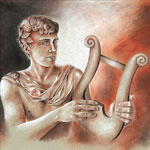 7. Grand Tour (2019)
7. Grand Tour (2019)
BBT’s last studio album with the core of its 2013-20 lineup intact widened the scope of its songwriting beyond the history of England to embrace new subjects both near—Continental Europe, especially Italy—and far, as in the depths of outer space. In every case, the band brings the worlds its songs inhabit to three-dimensional life while telling stories of modern travelers (“Alive”) and Byzantine empresses (“Theodora In Green And Gold”), classical poets (“Ariel”) and interstellar explorers (“Voyager”). By this point the seven-piece core lineup had developed an excellent feel for managing arrangements and giving each member opportunities to shine, and the end result is an album whose best moments continue to grow on me, “a soul-stirring embodiment of the transformative journey.”
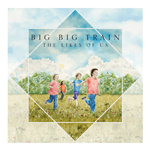 6. The Likes Of Us (2024)
6. The Likes Of Us (2024)
The task at hand was monumental: relaunch the band with a new lead singer (Alberto Bravin) and new keyboard player (Oskar Holldorf), just three years after its last major lineup shuffle. What’s astonishing isn’t simply that they achieved this goal, but that they smashed right through it and made an album that is both elegiac and celebratory, and stands with their very best work. It’s simply brilliant from top (shapeshifting overture “Light Left In The Day”) to bottom (anthemic closer “Last Eleven”), with a track list highlighted by riff-heavy “Oblivion,” gorgeous “Love Is The Light,” stirring, harmony-rich story-song “Miramare” and rangy, compelling epic “Beneath The Masts.”
5. Grimspound (2017)
Originally envisioned as an EP of extras from the Folklore sessions, Grimspound instead proliferated into an album every bit as memorable as its parent. The group’s “tales from history” narrative approach works magic again with the anthemic “Brave Captain” and “Experimental Gentlemen,” while “Meadowland” and the title track offer richly melodic odes to the land and its past. Meanwhile, Sjöblom, Longdon and Spawton team up to deliver an epic-length celebration of Enlightenment values in the remarkably dynamic, 15-minute “A Mead Hall In Winter.” Grimspound is edged by Folklore only because of my preference for the latter’s deep tracks.
 4. Folklore (2016)
4. Folklore (2016)
The expansive two-part English Electric album sequence made for a tough act to follow, and adding two more members to a studio lineup now numbering eight people certainly didn’t simplify the task. After working on, then abandoning a still-unreleased concept album, BBT turned its focus to the material that would become Folklore (and subsequently also Grimspound). The resulting album is a triumph, showcasing everything that is special about the group, from stirring rockers (“Wassail” and the title track) to gorgeous ruminations (“The Transit Of Venus Across The Sun” is sublime in every respect) to winningly told tales from history (the mid-length suites “London Plane,” “Winkie” and “Brooklands”).
3. English Electric Part Two (2013) English Electric Parts One and Two deliver two full hours of music—later collected and supplemented in the superb English Electric: Full Power package—centered on the working people and creators who, in Spawton’s words, “helped forge the English landscape.” Part Two opens with the breathtaking epic “East Coast Racer”—now generally regarded as BBT’s signature song—a 15-minute anthem celebrating a record-breaking locomotive that has all the emotion and sweep of a widescreen drama, and features outstanding performances from all concerned. Later highlights include the catchy, melodic “Keeper Of Abbeys,” the clever summing-up suite “The Permanent Way,” and stunning, elegiac closer “Curator Of Butterflies.” Much like the matched pair of Folklore and Grimspound, EE Part Two is edged out by Part One based only on my preference for the latter’s deep tracks.
English Electric Parts One and Two deliver two full hours of music—later collected and supplemented in the superb English Electric: Full Power package—centered on the working people and creators who, in Spawton’s words, “helped forge the English landscape.” Part Two opens with the breathtaking epic “East Coast Racer”—now generally regarded as BBT’s signature song—a 15-minute anthem celebrating a record-breaking locomotive that has all the emotion and sweep of a widescreen drama, and features outstanding performances from all concerned. Later highlights include the catchy, melodic “Keeper Of Abbeys,” the clever summing-up suite “The Permanent Way,” and stunning, elegiac closer “Curator Of Butterflies.” Much like the matched pair of Folklore and Grimspound, EE Part Two is edged out by Part One based only on my preference for the latter’s deep tracks.
 2. English Electric Part One (2012)
2. English Electric Part One (2012)
If The Underfall Yard set the standard, English Electric Part One proved that it was no fluke, establishing the band’s new configuration as a musical force to be reckoned with. Having proved a magically good fit as the band’s new lead vocalist, David Longdon proceeded to add his songwriting talents to the mix, as he and Spawton traded one instantly memorable tune after another, both individually and as collaborators. The shadowy, oppressive underground settings of “The First Rebreather” and “A Boy In Darkness” contrast with joyous celebrations of nature’s beauty above ground in “Uncle Jack,” “Upton Heath,” and dynamic, singalong closer “Hedgerow,” while Spawton movingly explores the connections between the English people and the land they inhabit in “Winchester From St. Giles’ Hill” and “Summoned By Bells.”
1. The Underfall Yard (2009)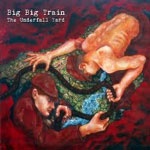
For the 20th anniversary of the Daily Vault we invited the writing staff to share “20 Albums That Influenced Me.” My list featured exactly two progressive rock albums, only one of which was issued after 1973. Nothing else since that era manifested the secret ingredients I was looking for: “the combination of warmth, flair, complexity, superb musicianship, emotional resonance, vocal quality and unique narrative perspective… This tremendous album carried every one of those key characteristics forward into a modern setting.” Easing into the listener’s consciousness with a steady-building sequence of thoughtful, intense songs, The Underfall Yard peaks initially with Spawton’s dynamic, moving elegy for his father, “Victorian Brickwork,” before scaling still-greater heights with the twisting, turning, consistently compelling and genuinely epic 23-minute title track. For this fan of a certain age, The Underfall Yard and the song it’s named for, along with "Victorian Brickwork," remain the band’s crowning achievements.
(If you've enjoyed your journey, stop by the station master’s office at www.bigbigtrain.com to learn more.)